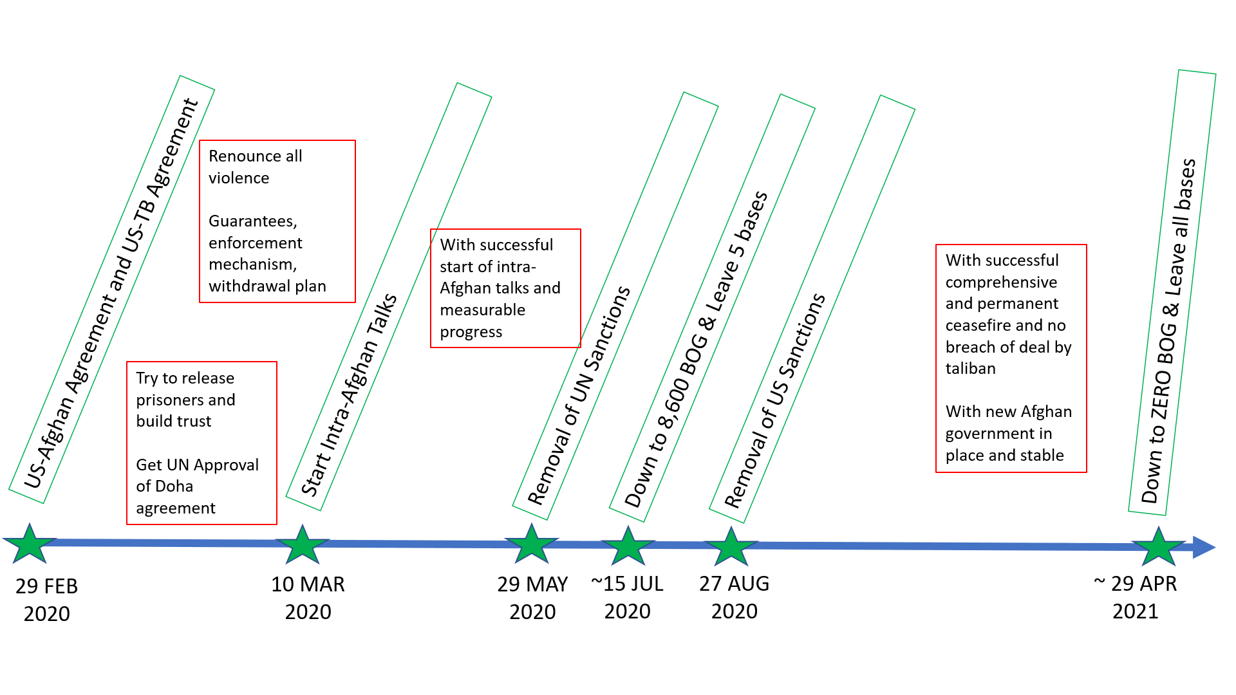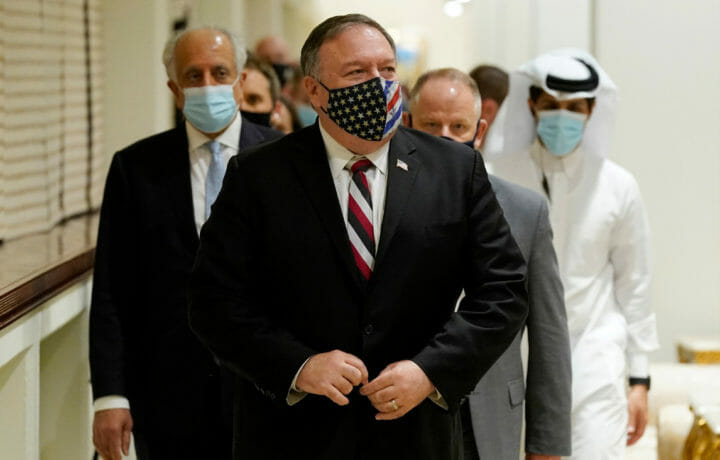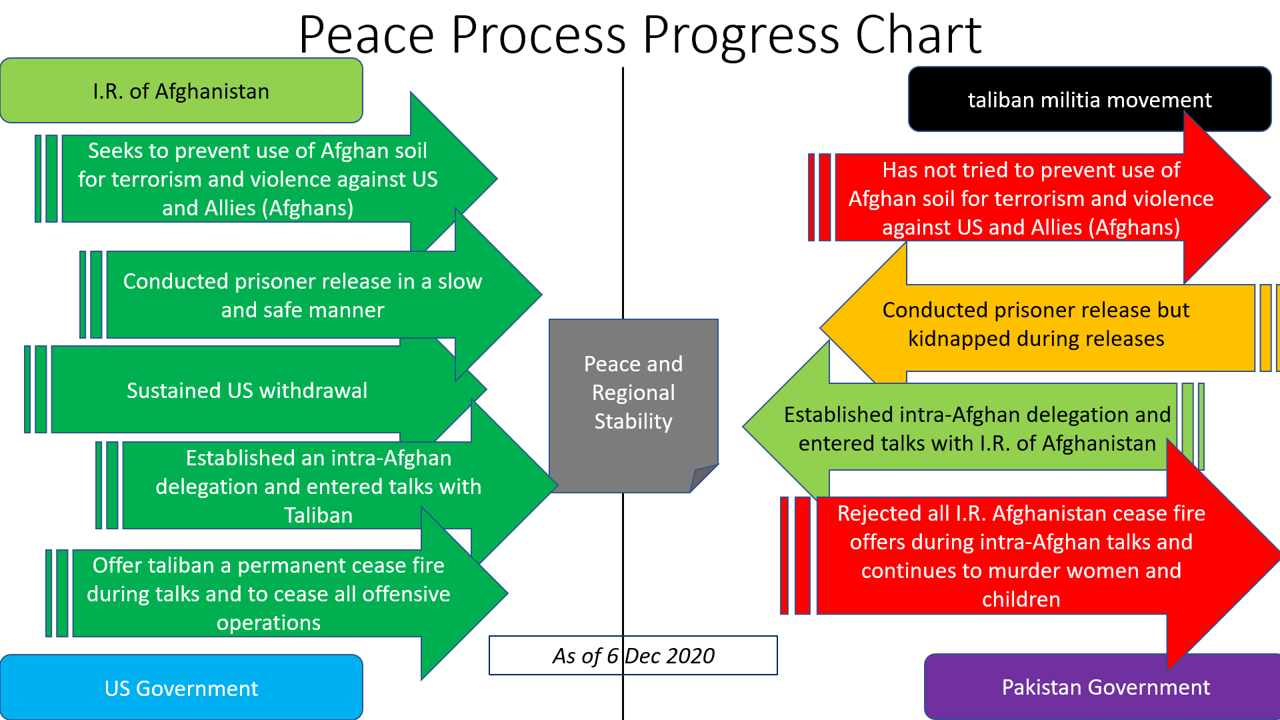Pausing or moving the Afghan Peace Negotiations until the Taliban agree to prioritize a temporary or long-term ceasefire is not the end of the world. Many nations and maybe even Afghans themselves seem to be hesitant about making the Taliban uncomfortable during the ongoing peace talks. This fear is holding back actors, with leverage over the Taliban and their supporters in Pakistan, from taking action.
Assessing the Doha Agreement

The Taliban have failed to fulfill their promises to the U.S. from the February 2020 Doha agreement. The Taliban have refused to break ties with terrorist groups or to stop them from committing terrorism on Afghan soil. That means the Taliban have not upheld their end of the deal in phase one of the 2-phase agreement.
Phase one required the Taliban to achieve the first crucial pillar: Renounce all violence by any group on Afghan soil against the U.S. or its Allies (Afghans are American allies too). This is the pillar that the removal of sanctions will really hinge upon. Counter-terrorism is what brought the U.S. and NATO to Afghanistan, it will be key to them departing.
Phase one also required the U.S. and the Taliban to finalize pillar two: Establish mutual guarantees, develop enforcement mechanisms, establish and follow a withdrawal plans all foreign forces.
That included removing a certain number of U.S. forces and departing a certain number of bases. The ultimate withdrawal goal, if the Taliban kept their promises was to remove all non-diplomats within 14 months. The Taliban have not given the U.S. any reason yet to achieve these withdrawal goals, but the U.S. has still begun to withdraw—ahead of this schedule. Phase two was only supposed to begin after phase one was complete, but again the U.S. and Islamic Republic of Afghanistan have overachieved despite the Taliban failing to finish phase one.
On September 12, 2020, pillar three of the Doha agreement began with the launch of intra-Afghan talks, known as the Afghan peace negotiations. This was a big concession for the Afghan government, who was not a party to the Doha Agreement. This was a larger concession for the Taliban militia, as they had stubbornly refused for almost 19 years to ever sit in a room to discuss a peace process with the Islamic Republic of Afghanistan. By entering the Afghan Peace Negotiations, the Taliban have recognized the existence of the Afghan Republic. This did permanent damage to the Taliban claims to still be the government of Afghanistan.
The final item of the Doha agreement has proven the most difficult to tackle, and the most important to the Afghan people. Pillar four is a permanent and comprehensive cease fire between the Islamic Republic of Afghanistan and the Taliban militia.
As all four pillars must be upheld until a new Afghan government is in place, according to the Doha Agreement, the Taliban must eventually address pillar four. Unless the Taliban execute pillar one and four of the Doha agreement (remember the Doha Agreement was enshrined as a guideline for the Afghan Peace Negotiations), the US and other coalition nations have no incentive to depart Afghanistan. The Taliban requests for the United State to lift UN and U.S. sanctions does not need to be fulfilled until the Taliban have renounced all violence from armed groups on Afghan soil and entered into a permanent and comprehensive cease fire.
What Can Diplomats Do?
Diplomats of many nations and intergovernmental organizations like NATO, the EU, and the Organization of Islamic Cooperation can take many actions now to ensure the completion of the Doha Agreement and to stop the daily human rights violations and war crimes against Afghan civilians by the Taliban and other terrorist organizations.
One simple and effective action is to eject the Taliban members, their families, and all their associates from Qatar where they are living in a luxury not afforded to Afghan citizens or Taliban fighters in Afghanistan. This will speed up the Taliban’s decision-making timeline. Discomfort and lack of security is a motivational factor whose time has come.
Additionally, Qatar can close the Taliban militia outpost in Doha that is operating like an embassy for a nation that does not exist. Forcing the Taliban to work from Afghanistan or Pakistan will allow the Taliban leadership to more closely understand what is at stake if they fail to uphold the Doha Agreement.
Pakistan can close the Taliban safe-havens in their country and arrest any Taliban members that refuse to move to Afghanistan. This will remove the comfort and safety of a sanctuary in which the Taliban can conduct recruiting, planning, and funding operations for their fighters inside Afghanistan.
The Afghan government with UN support can open a negotiation site in Afghanistan to resume the talks that are taking a pause until January 5, 2021. The Taliban have already been offered the ability to choose from anywhere they want in Afghanistan. As the Taliban claim to hold power over 70% of the country, that hypothetically leaves many suitable locations on the table.
Afghanistan and the Taliban, with international support, can open other alternate negotiation sites in Uzbekistan, Bonn, Oslo, and Muscat to rotate the future negotiation sessions between if Afghanistan proves an unworkable location
The international community can request that the Taliban start working first towards Pillar number four of the Doha Agreement by enacting a series of time-limited (yet nationwide) ceasefires (30, 60, or 90 days seem reasonable) with the Islamic Republic of Afghanistan. If the Taliban refuse to work on this critical remaining pillar of the Doha Agreement then nations should heavily sanction them, cancel all their travel visas globally, pause support for the peace talks, and resume NATO (if not U.S.) operations against the Taliban in Afghanistan.
Additionally, nations can sanction Pakistan economically if the Taliban will not commit to starting enacting pillar 1 and 4. Pakistan cannot be allowed to continue their double game of saying they support a peace process, but not using all of their leverage to achieve the key pillars that will lead to actual peace.
Taliban Need to Prove peace Goals
The Taliban must start to prove they truly seek peace, and not more death. Until now their actions have been selfish and have not decreased violence against Afghan citizens. The Taliban must gain the trust of the Afghan people, the government of the Islamic Republic of Afghanistan, and the international community supporting the peace talks. For negotiations to achieve peace, trust is needed. If one or all of these ideas are enacted, the Taliban may realize that they must start to build trust.





